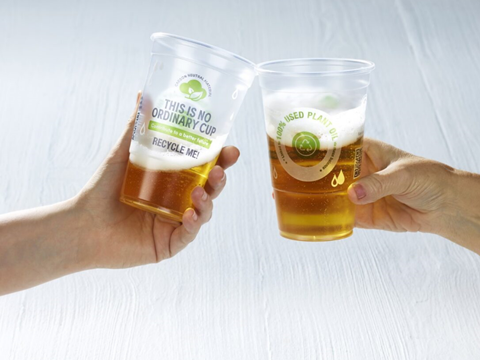
eGreen claims it is the first company to bring cups made from 100% renewable resources to the UK market. Switching production from virgin fossil fuels to a biobased polypropylene, the new VeriGreen range is primarily sourced from recycled plant oil used in the hospitality industry.
Manufactured in the UK, the material reportedly shows an 180% CO2 reduction from cradle to gate, calculated by a detailed Life Cycle Assessment (LCA) provided by the raw material supplier. In addition, eGreen states there are also emissions reductions as goods can travel directly from the point of manufacture to the customer.
Aiming to ensure that the credentials of the new material flow through the whole supply chain, the company says it has taken steps to reassure its customers by gaining an industry standard certification which audits the material source from cradle to the point of sale.
The VeriGreen cups are said to have benefits over paper cups due to being made from a mono-material, making collection and recycling easier. The cups’ transparent design hopes to make serving drinks such as beer and cider easier for operators, ensuring the correct measure is poured and the consumer is receiving a full pint. This is particularly the case in busy settings such as festival and events bars, where there is often pressure to serve quickly.
eGreen has produced the cups using the ‘Self-Destruct’ technology - if the cups escape collection and recycling and are left in the open air, they will apparently break down into an earth friendly wax that fully biodegrades within two years, leaving no trace of microplastics and toxins. The company states this is reinforced by the certification PAS 9017:2020.
Caroline Wiggins, chief executive of eGreen, comments: “Each cup features a unique message which underlines the product benefits and a QR Code which gives consumers more information about our technology. This therefore is educational tool which operators should perceive as a real benefit. Key target markets and customers are festivals, stadia, concerts, large scale events, universities, schools and drinks brands.”
Earlier this year, Faerch Group unveiled its recyclable takeaway cups, said to contain a minimum of 30% PCR material. Reportedly, the cups can be fully recycled into new food packaging throughout ‘endless’ cycles while maintaining their safety and functional properties.
More recently, Google selected nine companies to test their innovations at its foodspaces, as winners of its Single-Use Plastics Challenge, launched in 2023. Aiming to help the food and beverage industry reduce its plastic footprint, the solutions include data-powered bulk food dispensers and edible cutlery.
If you liked this story, you might also enjoy:
How are the top brands progressing on packaging sustainability?
The ultimate guide to global plastic sustainability regulation














No comments yet